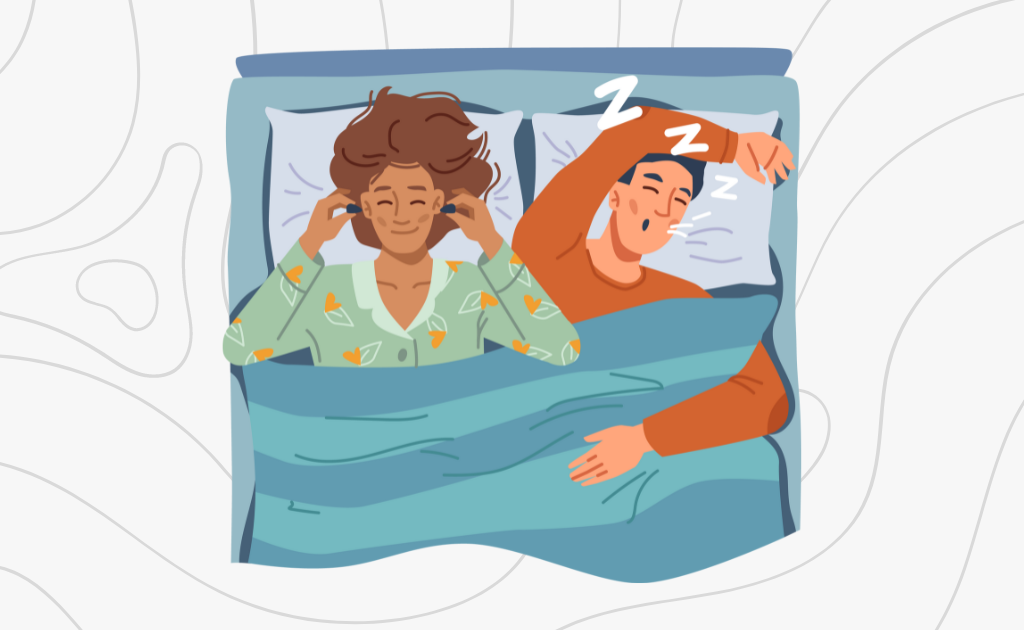
Snoring is a common condition that can disrupt the those who have it and their partners. In this article we will look at how to deal with snoring from both sides of the bed. Snoring happens when air can’t flow easily past the relaxed tissues in your throat, causing vibrations and noise. Most people snore mildly from time to time, but when it becomes a chronic problem there are reasons to be concerned.

Having your sleep interrupted due to snoring in the bedroom night after night can build feelings of resentment. Understandably this can have a negative impact on the health of your relationship. But did you know the affects of snoring can have a negative impact on you or your partners health?
Poor quality or limited sleep over a prolonged period of time can have serious consequences. Sleep deprivation can have the following effects:
Mood changes: mood swings, emotional, quick-tempered, depression, anxiety.
High blood pressure: people who sleep six hours or less may have increases in blood pressure.
Weight gain: hormones relating to appetite are affected by lack of sleep, meaning you may be more hunger or feel less full which can lead to increased eating and weight gain.
Memory issues: lack of sleep can negatively impact cognitive function, including short and long-term memory.
Risk of diabetes: people who are sleep deprived have higher blood sugar levels, increasing risk of type 2 diabetes.
Risk of heart disease: sleep deprivation can increase heart rate, blood pressure, and plaque build up putting stress on the heart.
Weakened immunity: people who don’t get enough sleep are more likely to get sick, and will take longer to recover.
Poor balance: studies have shown that lack of sleep can negatively impact control of balance, which can increase risk of falls and accidents.
Having your sleep disrupted is incredibly frustrating, whatever the cause. Most partners prefer to sleep in the same bed, but snoring can make this difficult. There are a range options available that can help you get that much needed sleep.
Use a white noise machine: the sound produced by these machines is soothing unchanged noise to listen to and can help mask other disruptive noises like snoring. Some noise machines come with a variety of sound “colours” which have different frequencies. You may find that there is a certain colour that works best for you. Lower frequency colours like pink and brown noise are popular.
Clear your mind with meditation: when sleepless nights due to snoring drag on, the feelings of anxiety, dread and desperation associated with trying to get some rest can become significant. Practicing meditation can be fundamental in relaxing your mind. Try listening to a guided meditation, or mindfulness meditation.
Wear ear plugs: there are a wide range of ear plugs available in different sizes and materials. The popular soft foam ear plugs can be a quick and easy way to muffle the sound of most snorers. However, if that isn’t enough you can also buy silicone moldable ear plugs which are often used by people working in very noisy environments. You can even get custom ear plugs can be more comfortable and effective.
Listen to music or an audio book: along the same lines as white noise machines, listening to music or an audio book may help you drown out the sound, distract you from the snoring, and relax your mind. Using noise cancelling headphones might be of additional benefit.
Sleep in a different room: choosing to sleep in a different room is an option that some couples may see as quite intimidating. But it has been found in research that choosing to sleep apart due to snoring is actually better for the health of your relationship than not doing anything. Create the time and space required to allow you to improve your sleep hygiene before returning to sleeping in the same bed.
Almost half of all adults snore occasionally. When snoring becomes more frequent, or chronic it may need to be addressed. Here are some of the strategies you or your partner can try to reduce or manage snoring.
Change sleeping position: Whether you are reclined in a lazy-boy or laid out on the bed, sleeping on your back facing the ceiling is worse for snoring. Positional therapy for snoring can dramatically impact your ability to breathe and may reduce snoring by encouraging sleeping in other positions like on your side.
Lose weight: being overweight is linked to snoring, increased fat around the neck or belly can increase pressure on the airways and lungs. Especially while relaxed and sleeping laying on your back. Losing weight can lower risk.
Limit alcohol and certain medicines: alcohol and certain medicines relax the muscles in the throat, which can contribute to snoring. Check with your pharmacist or doctor if any of the medicines you take may contribute to snoring.
Tried a nasal decongestant: If you have a cold or seasonal allergies then nasal congestion may be causing you to snore. Nasal decongestants and nasal steroid sprays can help to alleviate snoring.
Nasal dilators and strips: there are a range of products available that can be used to improve nasal breathing. Nasal dilators and strips can be used to help open the nasal passages and improve breathing.
Get evaluated: snoring can have many causes, a doctor can assess the possible causes, and may be able to suggest a range of treatment options. They can also determine if obstructive sleep apnoea the cause.
While snoring is very common in adults, it can range in severity and can be caused by underlying medical conditions. Chronic snoring can increase your risk of certain health conditions and may be a sign of obstructive sleep apnoea (OSA), a condition where you stop breathing when you sleep.
If left untreated OSA can have serious complications including:














